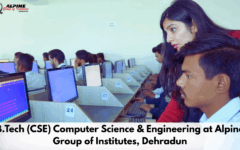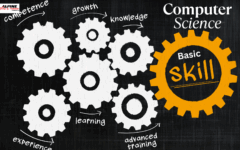Skills Required for Success in Computer Science (CS)
2024-12-13 6:52Skills Required for Success in Computer Science (CS)
Success in Computer Science (CS) goes beyond just passing exams and assignments—it’s about developing a broad set of skills that will help you solve complex problems, adapt to rapidly evolving technology, and thrive in a competitive job market. Below are the key skills you’ll need to succeed in a B.Tech in Computer Science and beyond.
1. Programming and Coding Skills
One of the most fundamental skills for a CS student is the ability to write efficient and clean code. Programming is the foundation of all computer science work, from software development to machine learning. Here are key programming-related skills:
- Languages: Proficiency in programming languages like C, C++, Java, Python, and JavaScript is essential. Each language has different applications, and understanding their strengths and weaknesses will make you versatile.
- Data Structures and Algorithms: Knowing how to use and implement data structures (e.g., arrays, lists, trees, graphs) and algorithms (e.g., sorting, searching, dynamic programming) efficiently is crucial for solving complex problems.
- Version Control (Git): Familiarity with Git for version control allows you to manage code, collaborate with others, and track changes in software development projects.
2. Problem-Solving and Analytical Thinking
Computer science is all about solving problems with logic and creativity. Developing strong problem-solving and analytical thinking skills will help you break down complex challenges and find effective solutions. This includes:
- Algorithmic Thinking: The ability to design and analyze algorithms that can solve problems efficiently. Understanding time and space complexity (Big O notation) is crucial.
- Logical Reasoning: The ability to reason through problems logically, understanding the relationships between variables, operations, and data flow.
3. Understanding of Computer Systems
Knowing how computer systems work—from hardware to operating systems—is essential for any CS student. Some critical areas include:
- Operating Systems: Understanding how OS manages memory, processes, file systems, and hardware resources.
- Computer Architecture: Familiarity with how computers process data and execute instructions at the hardware level.
- Networking: Knowledge of computer networks, including protocols (TCP/IP), DNS, HTTP, and network security, is crucial for backend developers and systems engineers.
4. Database Management
With the increasing amount of data being generated, being able to efficiently store, manage, and retrieve data is a critical skill.
- SQL: Proficiency in Structured Query Language (SQL) is essential for interacting with relational databases and retrieving data effectively.
- NoSQL: Familiarity with non-relational databases like MongoDB, Cassandra, and Redis is becoming more important, especially for big data applications and real-time web apps.
- Database Design: Understanding how to design efficient, scalable databases, and knowing about concepts like normalization, indexing, and ACID transactions.
5. Software Development Skills
Building software that is functional, scalable, and maintainable requires knowledge of best practices in software engineering.
- Software Development Life Cycle (SDLC): Familiarity with development methodologies (e.g., Agile, Scrum, Waterfall) and understanding how projects progress from planning to deployment.
- Testing and Debugging: The ability to write test cases (unit tests, integration tests) and debug code efficiently is critical for ensuring code quality and robustness.
- Frameworks and Libraries: Understanding how to use development frameworks and libraries (e.g., Django for web development, TensorFlow for machine learning) to accelerate the development process.
6. Cloud Computing and DevOps
Cloud computing has become a critical part of modern software infrastructure. DevOps practices help to integrate development and operations teams to improve collaboration and software delivery.
- Cloud Platforms: Knowledge of cloud platforms like Amazon Web Services (AWS), Microsoft Azure, or Google Cloud is valuable, as they are used to deploy and scale applications in real-world environments.
- Containerization: Understanding tools like Docker and Kubernetes for creating and managing containers will make you familiar with cloud-native applications.
- CI/CD Pipelines: Understanding Continuous Integration and Continuous Deployment (CI/CD) pipelines for automating code testing and deployment.
7. Cybersecurity Awareness
As cybersecurity threats continue to rise, having a good understanding of security principles is important for protecting systems and data.
- Encryption and Authentication: Knowledge of how data is encrypted, and how to implement authentication mechanisms like OAuth, two-factor authentication, and secure password storage.
- Network Security: Familiarity with securing networks, firewalls, and intrusion detection systems.
- Ethical Hacking: Having a basic understanding of penetration testing and vulnerability assessment to identify and fix security loopholes in applications.
8. Machine Learning and Artificial Intelligence
With AI and ML transforming industries, having foundational knowledge in these areas will give you an edge in today’s tech world.
- Supervised and Unsupervised Learning: Understanding the core principles behind algorithms like linear regression, decision trees, and clustering.
- Deep Learning: Familiarity with neural networks and frameworks like TensorFlow or PyTorch to implement AI models for applications like image recognition and natural language processing (NLP).
- Data Science: Knowledge of how to handle, analyze, and visualize data using tools like Pandas, NumPy, and Matplotlib.
9. Communication and Collaboration Skills
Computer scientists often work in teams and interact with stakeholders who may not have a technical background. Therefore, communication skills are crucial:
- Teamwork: Being able to work effectively with cross-functional teams, including designers, product managers, and other engineers.
- Technical Writing: Writing clear documentation, reports, and project proposals is essential for communicating complex technical information to non-technical stakeholders.
- Presentation Skills: The ability to present technical ideas in an accessible and engaging manner, whether in meetings or conferences.
10. Adaptability and Continuous Learning
Technology is evolving at a rapid pace, and a successful CS student must be prepared to learn new tools, frameworks, and programming languages throughout their career.
- Self-learning: The ability to pick up new concepts on your own through online resources, books, and tutorials.
- Keeping Up with Trends: Staying updated on emerging technologies such as blockchain, IoT, edge computing, and quantum computing will help you remain relevant in the field.
11. Time Management and Organizational Skills
In a fast-paced academic environment like B.Tech in Computer Science, managing time efficiently is key to succeeding in assignments, exams, projects, and internships.
- Task Prioritization: The ability to prioritize tasks effectively, especially when juggling coursework, coding projects, and extracurricular activities.
- Project Management: Knowledge of project management tools (e.g., Jira, Trello) to track tasks and collaborate with team members during group projects.
Conclusion
The skills required to succeed in Computer Science are diverse and extend far beyond just coding. Strong problem-solving, critical thinking, and technical abilities are fundamental. However, soft skills like communication, collaboration, and adaptability are equally important in ensuring long-term success in the field. By focusing on developing a broad skill set, you’ll be well-equipped to tackle complex challenges and excel in the rapidly evolving tech industry.








